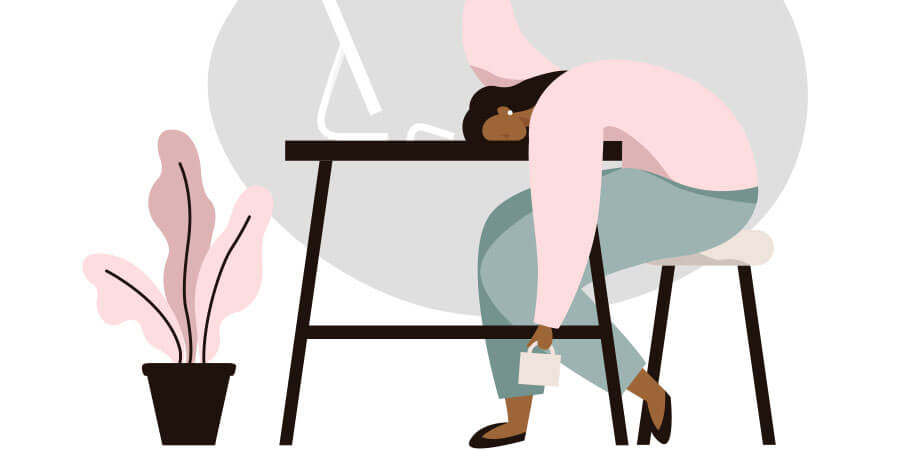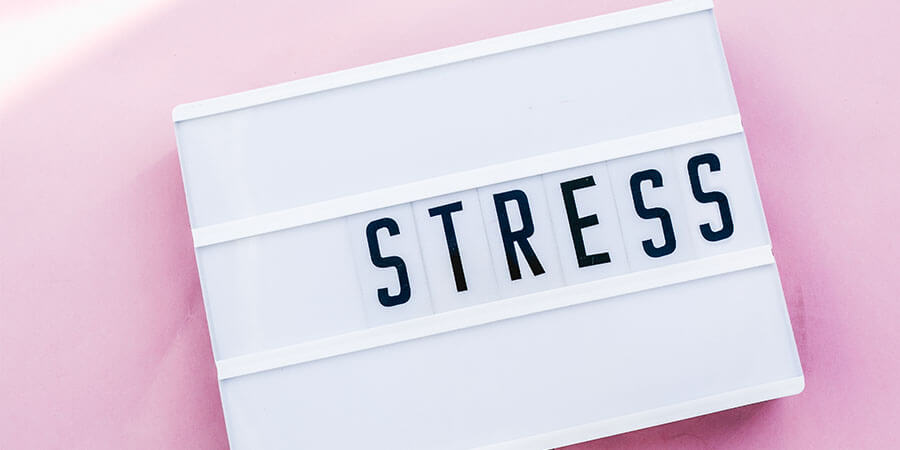How to cope with workplace stress in the salon


Feeling overwhelmed by the coronavirus outbreakand what it means for you and your business? Or perhaps you’re worried about a colleague who seems on edge in the salon. You’re not alone. Over 11 milliondays are lost every year thanks to stress at work. A 2019 reporteven found one in 10 of us are thinking about quitting our jobs because of stress.
All of which means it’s vital we learn to recognise the signs we’re stressed, and also know how to help ourselves... and our colleagues.
Neil Shah from the Stress Management Societysays, “We are the healthiest people to ever live on this planet, yet we’re more miserable than at any point in recorded history. Stress and mental health are among the biggest issues impacting modern society. We need to take the stigma away from stress and make sure people get the support they need.”
What are the symptoms of stress in the workplace?

There are lots of signs you, or someone you know, may be suffering from stress. According to the NHS, these could include:
- *headaches and/ or dizziness
- *chest pains or a faster heartbeat
- *difficulty concentrating
- *struggling to make decisions
Neil says, “Look out for any changes in behaviour as this is also an indication of stress. For example, someone who is normally shy and reserved may become overly talkative or aggressive. They might stop taking pride in their appearance or stop eating and rely on coffee and sugar.
“The key thing is, are you out of your normal pattern of behaviour? Or are you seeing that in others? If so, think about what is causing it. Lots of these signs together could suggest someone is emotionally compromised.”
Coping with coronavirus stress
Life is incredibly stressful for us all thanks to the COVID-19 outbreak. And with our all lives changing dramatically, how do we cope with the feelings of anxiety that brings?
Neil says, “The world is currently gripped in a very scary situation around coronavirus. But there are three pandemics happening. The first pandemic was the fear of coronavirus. The second was coronavirus itself. But the third pandemic, which we are inevitably going to see, is the mental health pandemic. Poor mental health is already one of the biggest issues affecting us today.”
To cope with this, it’s important to take back your power says Neil.
“Right now we have tremendous power in how we choose to act in this scenario. There is social distancing but it might also be time for social media distancing, too. It might be time to unplug from Facebook, to stop consuming the news because ultimately that may just be taking your power away.
“No matter where you are and what your state of health, you will benefit by disengaging from the panic mongering. Keeping yourself happy and being able to make light of even the darkest of situations can massively increase your chances of being able to cope with what is otherwise a heavy situation.”
“One of the first steps is making it okay to have a discussion and reach out and ask for help. Make it okay to not be okay.”

What are the main causes of stress at work?
Away from coronavirus, there are lots of things that can cause stress. Although working out what is making you feel stressed can be tough. Is it the number of clients you’re expected to squeeze in every day? Or an unreasonable boss who, you feel, is expecting too much from you?
Neil suggests taking a step back and looking at what else is happening in your life that could be contributing to your feelings.
“It’s not what is happening, it's your perception of it”, he says. “You could have times when you have lots of pressure and you cope with it just fine. Then there could be other times you come into work, one thing goes wrong and it could be the end of the world.
“There’s not one thing that causes stress. I liken it to a bridge. If you keep adding weight to a bridge, eventually it will collapse. But before it collapses you’ll know it’s not coping particularly well because it will be groaning and buckling. And that’s the same for us. It doesn’t matter who you are, everyone has a breaking point.
“You have two choices: take the weight off. Or reinforce and support the bridge.
What strategies are there for managing stress at work?
If you’re feeling stressed, Neil suggests trying these strategies to help...
Destigmatise stress
The first step is accepting that feeling stressed isn’t a sign of weakness, or anything to be ashamed about. Neil says, “People admitting when they are emotionally compromised should be seen as a sign of strength. But often people don’t want to admit they are stressed or put their hand up and ask for help.
“One of the first steps is making it okay to have a discussion and reach out and ask for help. Make it okay to not be okay. We live in a culture where if you hurt your leg, no one bats an eyelid. When it comes to mental health no one wants to talk about it. We all need to get comfortable talking about it.”
Focus on your staff wellbeing
If you’re a salon owner, it’s vital you treat your staff’s emotional health as a priority says Neil.
“It’s often seen as a ‘nice to do’ thing and not taken seriously. If you are looking at your sales and marketing strategy, that would be tied to the business plan. If you’re looking to grow your business, that would be in your plan as well. The most important asset of any organisation - no matter how big or small - is your people. When you have a people wellbeing plan, look at how the people within your organisation are supported to be able to work at their very best. How are you ensuring you are making wellbeing a priority?”
Learn to say no
If you feel overwhelmed by your workload, or trying to balance family life with the salon, then saying ‘no’ could help reduce that stress. Neil says, “Lowering your levels for stress can be as simple as and straightforward as just saying no. When you say no to something you are not being selfish. You are honouring your existing commitments and this means that you can devote more time to them and do them properly. Don’t view a no as a rejection more think of N.O. as an acronym – A Negotiation Opportunity – make sure both parties work together to agree a mutually acceptable outcome.”
Get active
When you feel stressed, your body goes into ‘fight or flight’ mode, leaving you tense and jittery. So Neil recommends giving your body what it is expecting. “Your body is preparing for some kind of physical activity. When you engage in that, it burns off the stress hormone cortisol. You don’t need to go to the gym. Just going for a walk will be enough for your body to start releasing feel-good hormones like serotonin and endorphins to make you feel better.”
Improve your sleep
If you’re stressed, you might find you’re having trouble sleeping at night. And this stress fatigue only adds to your feelings of being overwhelmed.
Neil says, “Just as you would with a child, you need a wind down bedtime routine. Practice good sleep hygiene - don’t turn the TV on just before bed or fire up the iPad. Instead, start winding down, read a book, have a bath. All of this is going to massively increase your chances of being able to go to sleep.”
Report it
If your feelings of stress are not lessening - and you feel what is expected of you at work is not reasonable - then you can get expert help.
“Employers need to provide a workplace that is safe and healthy, and that includes mental and emotional health”, says Neil.
“Go to your line manager first and then, if that doesn’t work, someone more senior. If you still don't get anywhere then report it to ACAS or the Health and Safety Executive.”
For more tips on coping with stress at work, check out our stress busting tips for the summer season and self-care strategies for coping with anxiety.


